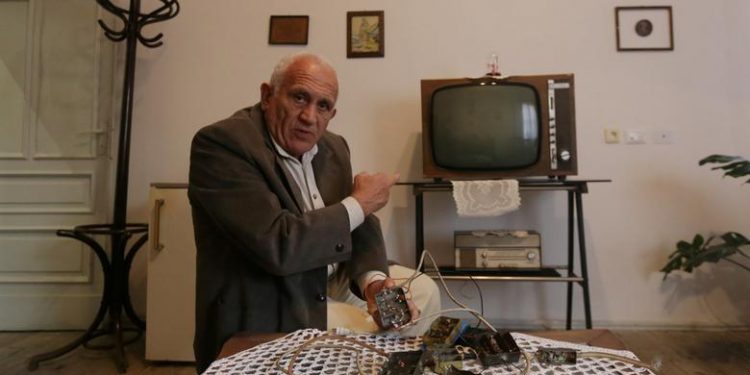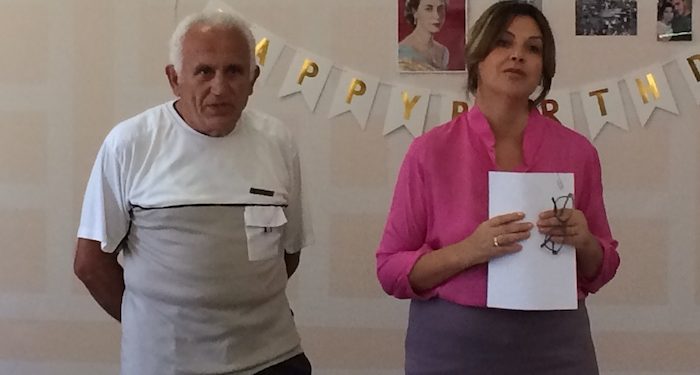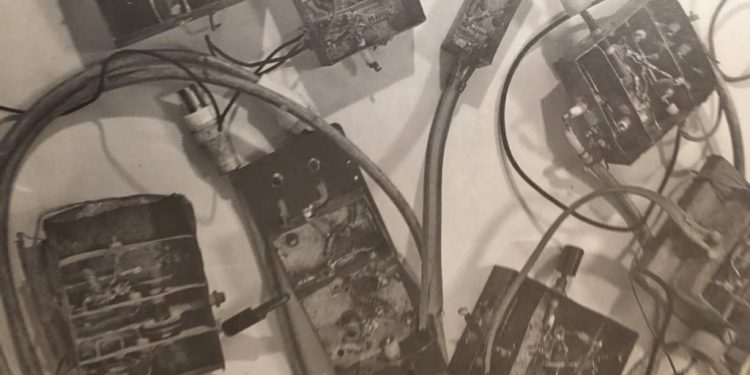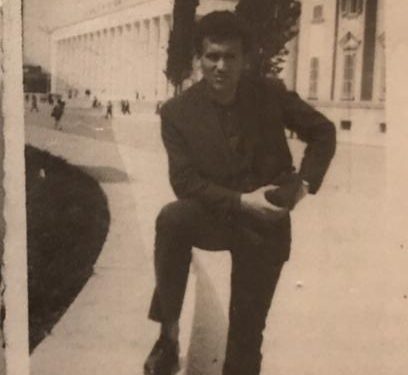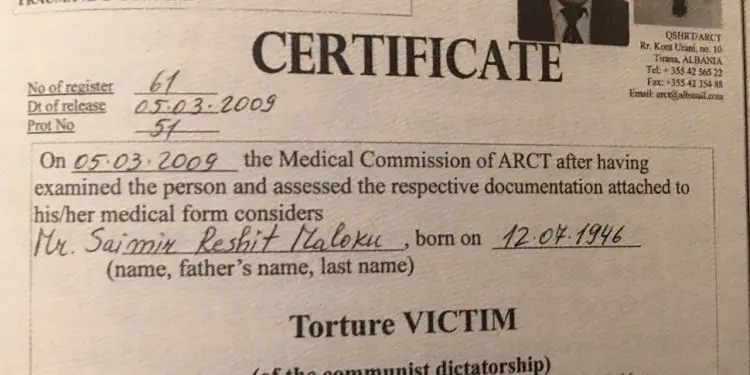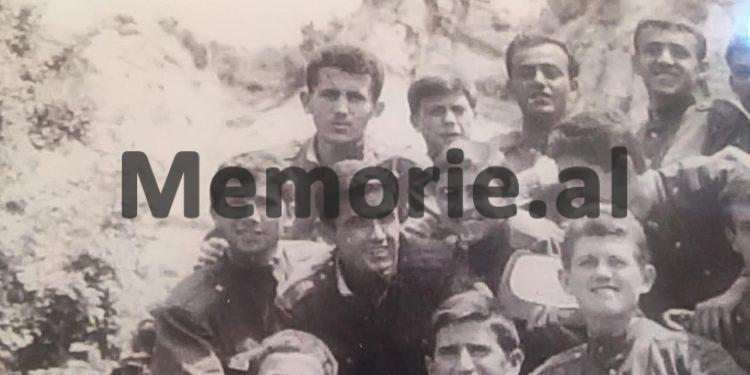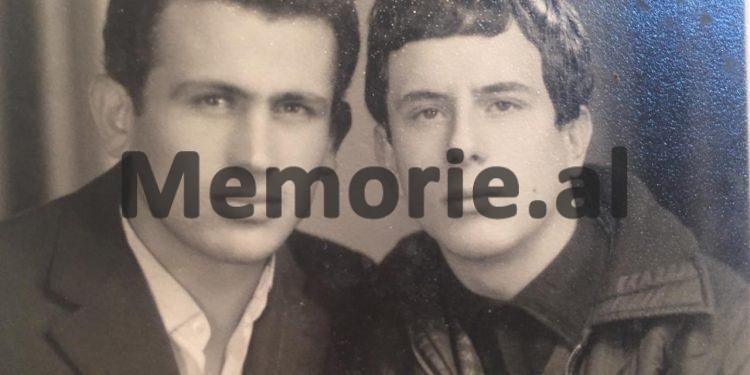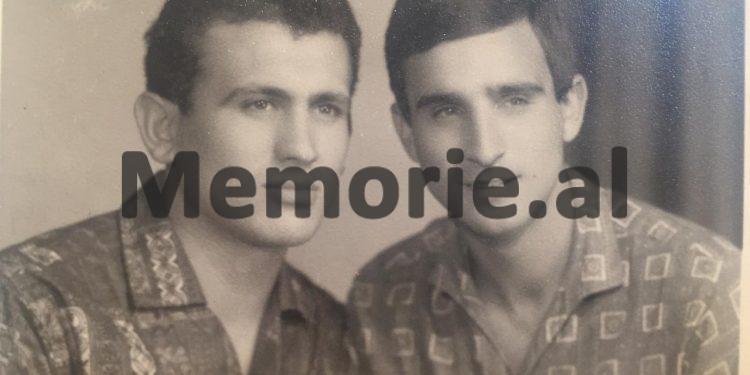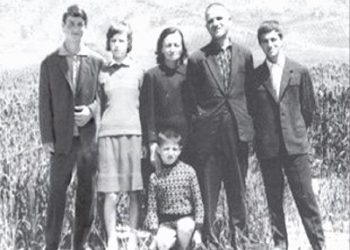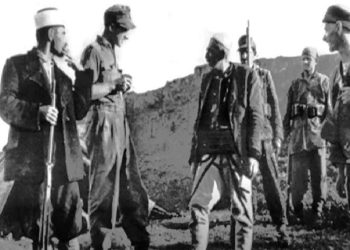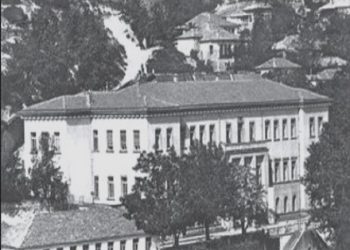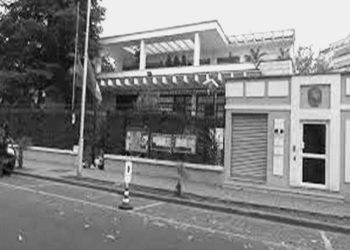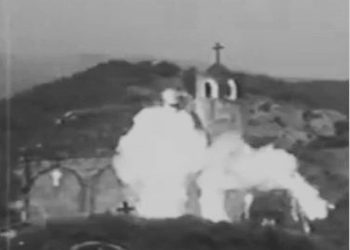Saimir Maloku
Part seven
Memorie.al/ publishes some of the unknown stories of Sajmir Maloku, a former military engineer who graduated with a ‘Gold Medal’ at the University of Tirana, who was arrested by the State Security on May 13, 1976, in the presence of 600 people in a large movie theater in the city of Burrell, accused of being a “potential agent of British Intelligence and of agitation and propaganda against popular power and the communist regime.”
Regarding the real reason for his arrest, Sajmir Maloku testifies: “Because the Albanian Public Television broadcast only 4 hours of television broadcasts per day, in 1970, reading a lot of foreign scientific literature, I managed to build a simple electronic television device. (converters of UHF Band to VHF TV signals). This invention of mine made it possible for the Albanian people in the future to watch freely the shows of the Italian and Yugoslav television stations of the UHF Band, especially in the mountainous and coastal areas of our country.
The first question the investigator asked me in the first investigative session was: “You are a famous Western spy, just like Mata Hari. “Tell us, you filthy enemy, your agency activity with the Secret Agencies of 17 Foreign Countries of the West and the World”. This is because the State Security had great doubts about my meetings with foreign tourists over 8 years and the numerous postal correspondences with philatelists of the above countries. Today this investigator is alive.
During a search of our home in Tirana and my hotel closet in Burrell City, State Security found and retrieved the Holy Books of the Bible and Quran in English; many old English books and magazines; some dictionaries and blocks with sketches of modern television antennas; my electronic TV equipment with two transistors and TV signal amplifier; etc “.
All these and other events of his life, from: childhood, schooling, youth period with life in Tirana in the early ’70s, pursuit and surveillance by the State Security, graduation, appointment as a military liaison engineer in a department of Burrel, arrest, trial and public unmasking, investigation, prison, etc., Sajmir Maloku has summarized in a book entitled “HOW I SURVIVED IN THE COMMUNIST HELL” (Publication of EMAL in Albanian and English), parts of which he has given for publication exclusively for Memorie.al
Continued from the previous issue
“Why was the arrest warrant for your father, Reshit, annulled”?!
The postal correspondence was checked by the State Security officer for Burrell Prison. These State Security officers at Burrell Prison and other political prisons, we prisoners called the prison or camp operative. For disciplinary violations, they interrupted the meeting with the family members, as well as the correspondence of the political prisoner for up to three months. My happiest event at Burrell Prison was the arrival of my paralyzed father, mother, and 6-year-old granddaughter to meet with me. The meeting with the parents lasted more than 15 minutes at the small counter of the large metal door of the prison. I kissed them with great joy and with tears in my eyes their hands passing through the small door counter. The father, paralyzed, was leaning on a cane and holding on to my mother. Luckily, there was a policeman at the meeting door whose TV I had once set up. He was a good man and allowed me to speak English fluently with my father.
The father, taking advantage of this, told me that the State Security wanted to arrest him, accusing him of being an Anglo-American agent, but canceled the arrest warrant because he was severely paralyzed. The military doctors and those of the neighborhood did not allow such a thing, because they themselves would bear legal responsibility, in case the paralyzed person was arrested and then died in prison. My father told me that some of his friends had informed him that the State Security had set up electronic eavesdroppers in our house and was being monitored day and night by them. So, the State Security spies were made for my house “like caterpillars who wanted to suck in as much information as possible and then suck our blood when they killed me and my father, Reshit.”
“Security Associate from Burrell in our house”
Also, even though he was quite ill, he had sworn that alive or dead, he would come to see me and see how I had been almost transformed into a corpse after all that suffering I had endured for nearly 200 days in the dungeon. This sight of mine had caused a commotion and aroused anger among the many inhabitants of Burrel and Tirana. He told me that in our house even the walls of the rooms seemed to have ears. This is due to the electronic interception devices installed by the State Security, in order to be informed about our family conversations with our relatives and friends or neighbors. Also my father told me about the low gesture of State Security associate, H.C. who had come from Burrell to our house with a suitcase inside which was the eavesdropper and electronic recorder, with the secret mission to record family conversations provoked by this vile man, who later died of cancer, condemned by God to life beyond as did many spies, witnesses, militants and State Security officers who were like “fish needles” to me and my late father.
On this occasion I thanked Jesus Christ that the communist regime did not deport my parents, having sick in the family circle. My father also informed me of the massacre that the State Security had carried out in our house, burning the Holy Books of the Bible and the Qur’an, and dozens of other old English-language art books. But he was glad he was able to save a large photograph of Queen Elizabeth II, Stuart Mann’s 1957 English-Albanian Dictionary and Nelson’s 1922 English-English Dictionary Highroads, which his father used when he was in the American Technical School of Tirana, etc. Also, my father told me about the letter they had sent to the Prime Minister, accusing us in vain as British agents, because these tourists, as it turned out, were friends of Albania and on the words spread by the State Security that Saimir Maloku was crazy. , his whereabouts were not indicated.
“In Burrel Prison, with Osman Kazazi, my father’s friend”
This I repeated every time my family brought food to the prison. This is because I experienced it myself in the underground cell, how horrible it was for man the great hunger and complete loneliness. This sacrifice and my humanitarian aid, made me very quickly gain the respect of my roommates. This, based on the expression: “A good friend is known in difficult days”. With these humane and subsequent actions, I showed the education and humanism of my family, which was one of the oldest families in the capital. In this prison I had the good fortune to have in the room a close friend of my father, who was called Osman Kazazi, once a youth friend at the American Technical School in Tirana. He gave me great moral, spiritual, and educational help so that I could endure the longtime of imprisonment I had to spend in that prison. After 28 years in prison, with the victory of Democracy, he was elected president of the National Association of Former Political Persecuted of Albania.
“My letter-complaints from prison to the General Prosecutor’s Office”
Also, in this prison I learned more about the crimes of the State Security and the communist regime. Friends in my room informed me that the State Security spy in my cell with the initials D.Gj. was called Xh.Gj. He had been released for several months. They showed that he was a very bad and deceitful man. Also, in prison, with the help of Uran Kostrec, I began to learn Italian intensively. And the other roommate, Kurt Kola, became one of the top leaders of the National Association of Former Political Persecuted of Albania for many years. While his son, Bilal Kola (Young), after university studies in London, is today the director of the Institute for the Integration of the Former Political Persecuted of Albania. From prison, every month I sent a letter of complaint to the General Prosecutor’s Office of Albania, for the procedural violations of the court that had been committed in my trial, because they had not given me a sheet – the indictment; they had not notified me and my family of the trial; for the torture and inhuman treatment of the State Security officers by the investigator; for the extremely humiliating insults and beatings against me when the trial by extremist militants ended; leaving me after the trial for another three months in the basement; for not informing my family about my location etc.
My father, with tears in his eyes, told me that he prayed to God that he would be alive until I was released from prison and why not, get married. Here is the great and extraordinary sacrifice of my father, severely paralyzed, who with the help of God came and met me in the most terrible prison of Albania, despite the danger of his life. Because this was my first meeting with my family, and I was a well-known person from the town of Burrell, they allowed me to take plenty of food from my family, even bringing me milk powder. During this period, I ate light food for almost three months, so as not to damage the kidneys and stomach. I did this based on the experience of the prisoners in the Auschwitz and Buchenwald Concentration Camps at the end of World War II. For humanism, even of great poverty, I, at the wish of my parents, divided half of my meals into 23 equal rations for all the roommates in my room.
“Jorgo Dhrami, the representative of the Complaints Office, came and met me in prison”
After almost a year, after many letters sent to high state institutions by me, the main representative of the complaint’s office of the General Prosecutor’s Office of Albania, Jorgo Dhrami, came to the prison to meet me. This wonderful and righteous man, I still to this day consider him a close friend of my life and family. He verified all the proceedings of my trial, the file in the Prosecutor’s Office, the Court and the Burrel Branch of Internal Affairs, where numerous legal and judicial violations by all these state institutions were proved and had adversely affected my unjust sentence. Based on the report of this inspector of the General Prosecution, Jorgo Dhrami, in the city of Burrel, came the inspection team of the High Court, where it was like its inspector PH, who inspected and verified my file and some other files, for reasons of numerous judicial violations of my judge YT, who was dismissed.
“How they sent me to Ballsh Prison, to hide injustices”!
I must recall that the communist regime, in order to cover up its crimes and conceal the criminal activity of judges, prosecutors, State Security and Investigation officers, removed the Ministry of Justice from 1966 to 1991. Then, on a proposal of the General Prosecutor’s Office, to cover and hide these flagrant legal violations of the relevant institutions of the city of Burrell and that I do not continue to complain again, after two years I am sent for several months to Ballsh Prison. This prison was 150 km. away from the capital. There were about 700 political prisoners in this prison, mostly of old age. Most of them were ill and did not work. The Ballsh Prison Command forced political prisoners to listen collectively for almost two hours to reading the books of dictator Hoxha and his articles and headlines in the main newspaper of the Communist Party, “Zeri i Popullit”. Indeed, there was the voice of the Communist Party and not of the People. In this prison I met and befriended Petrit Velaj, who was a real Mandela of Albania, who did 37 years in prison and 5 years in exile. The story of his life was full of suffering and criminal torture, which the communist regime could not bring to its knees for its anti-communist convictions, because its ideal was today’s Western democracy. The prisoners were mostly dressed in very old and torn clothes, while on their feet they wore rubber bands. We slept in several large wooden huts and in bunk beds. These barracks were cold in the winter. We had two blankets and narrow mattresses stuffed with wheat straw. All day the prisoners walked in the yard, played chess or dominoes, and so on. Sometimes every month the Ballsh Auto Cinema came and showed us an Albanian educational feature film. It was unfortunate to see so many priests and overly old prisoners, who had gone through a great ordeal of decades of suffering and most of whom had been forgotten by their families. Often from their distressed souls you hear only one word: “O God, when will we be free, because we rotted in these communist prisons ?!”
“In Ballsh I met Vasil Kat, he was condemned by Enver’s jealousy”
Communism had eclipsed their youth just like sunlight in the light of the solar eclipse. Suffering, torture, starvation, and poor health caused these prisoners to age prematurely, as well as to look like living corpses with wrinkles all over their foreheads and gloom. Some of them went insane or ended up in psychiatric hospitals or sanatoriums, where they died after a few years. There I had the good fortune to be in a residential shed with Vasil Kati, the father of my classmate at the Faculty of Engineering, Adrian Kati. Vasil Kati was one of the old political prisoners, who was highly respected by all prisoners because he was quite cultured and who was sentenced and served more than 14 years in prison. His father, Spiro Katis, and his brother, Grigor Katis, had emigrated before the war and lived in the United States. His family was also interned for 16 years in the most remote villages of Albania. Before he was arrested, the couple Vasil and Fedra Kati, was the most charming couple among high personalities and this aroused the jealousy of the Hoxha family, who retaliated with the arrest and exile of the Kati family. Dictator Hoxha insultingly called this wonderful family the working-class bourgeoisie and branded it as linked to the US agency.
“In prison with Dine Fratari, his father was killed by the US Security”
In this prison was also my close friend Hajredin Fratari, who belonged to the most patriotic and cultured families of Albania. He was among the best engineers in the country. His father, Rauf Fratari, was the commander of the battalion and the first most patriotic squad of Southern Albania, which contributed a lot to the liberation of the country against the invaders during the Second World War. After the war he emigrated to the US. In 1973, he was assassinated in New Jersey by the bloody hand of the State Security because he was the main opponent of Communist Prime Minister Shehu during the War. The bad luck of Vasil Kat and Hajredin Fratari, suffered many Albanians from people close to living in America, and those who received their first studies at the American Technical School as well as their children. The same bitter fate struck my Maloku family. The State Security with false accusations arrested many of these citizens to scare our people from communicating with Albanian citizens living in America. But Democracy gave the right values to the Kati and Fratari families, being decorated with gold medals by the President of the Republic of Albania. Today these two families have made a great contribution to the victory and strengthening of Democracy by carrying a great reputation in our country. Ing. Hajredin Fratari co-sufferer, President of the Albanian Confindustria with the victory of Democracy, the well-known engineer Hajredin Fratari as president of a construction company, has contributed to the construction of 1500 residential apartments in Tirana, many hospitals, bridges, roads employing hundreds of construction workers. Seven years ago, all associations of politically persecuted, other unions, proposed his candidacy as President of the Republic of Albania. While today for many years he is President of the Albanian Confindustria. Here are the talented engineers imprisoned by the communist regime.
“In Ballsh, old prisoners exchanged food with a pack of cigarettes”
In the Ballsh Prison or camp the food was poor and the prisoners were increasingly hungry. Many political prisoners occasionally exchanged their daily ration of bread for a pack of cigarettes. This is because they, in order to remove the great boredom from the many years of suffering, did this by saying to us: “We can live without bread, but not without cigarettes”. It was a crazy sacrifice of theirs. Most of the convicts had spent many years in prison. The most revered people in the prison were the Catholic priests, who were highly cultured and respectful and were sentenced to many years in prison. They helped us learn Italian and how to cope with life’s difficulties. This is because I slept in a shack with many of these Catholic priests and tried to help them as well, considering that they were the people of God. I also had many wonderful friends there: Eqerem Meniku, Koço Flloko, Vasil Kati, Dashnor Mamaqi, Andon Sheti, Petro Marqidhi, Milto Vako, Hajredin Fratari, Roland Koçaj, Mark Shkreli, Dalip Xhaboli, Spartak Ngjela, Sarandi Lulo, , Mehdi Prodani, Petrit Velaj, Nuri Sallaku, Gramoz Mborja, Nezir Stërmasi, Aladin Kapo, Jamarbër Marko, Gëzim Peshkëpia, Maksim Rakipi, Syrja Vrapi, Refat Tufina etc. At Ballsh Prison, four former Merchant Navy officers, who were political prisoners, told us that the communist government was smuggling large quantities of cigarettes produced in Albania as well as other prohibited goods. Foreign and modern motorboats were loaded at night in the port of Durrës with smuggled goods and smuggled to Italy. This smuggling was controlled by State Security employees. To declassify this activity, all the officers were arrested, adding a political charge.
“Transfer from Ballshi to the infamous Spaç prison”
A few months later, in late 1979, I and many young political prisoners were transferred to the infamous 130 km Spaç Prison. away from Tirana. It was a re-education prison and a mandatory labor camp in the copper and pyrite mine. Spaç mine was near the camp, while the galleries were very primitive, where the rails, wagons and galleries were quite old. Copper ore galleries were up to 1.5 km. away, while that of pyrite was 2.5 km. away from Spaç Prison – Camp. A wagon filled with copper ore weighed up to 1.5 tons, while the one with pyrite ore, up to 2.2 tons. Sulfuric acid vapors and gases and dusts as a result of dynamite explosions from the mine galleries poisoned the air of the environment where we lived and worked. You did not see birds or wildlife as well as trees or vegetation in the area where we worked and lived. The water that all political prisoners drank contained sulfuric acid and this caused kidney disease (renal colic) and their infections.
“Punishment in Spaç of our friend by policeman P.”
During the winter we only watched the sun for two or three hours because the camp was built near the valley of a stream. Many of Spaç’s prisoners, out of sheer exhaustion, said that death was more valuable than the very hard life of working in these very primitive galleries, which had been made for them like real Hell. It became a common ritual that when we prisoners finished our work shift and as soon as we left the gallery door, we wished each other that we were alive, because there were often many accidents with consequences for life. Even if you finished or exceeded your work schedule, the police would not let you out of the gallery door, but you would have to stay inside as a punishment until your working hours were over. This caused great dissatisfaction among political prisoners. Otherwise, you were severely punished. One such case happened to a close friend of ours from Tirana, where a third-shift policeman with the initials named P. put metal handcuffs on his hands at the gallery door and left him outside in the middle of the great winter cold. at the top of the mountain where a strong wind was blowing. He was wearing only a pair of boots, a shirt and cotton shorts. The life of this wonderful friend of ours was endangered by a whim or brutality of this extremist communist police officer and the most infamous of Spaç Prison. A few years ago, the communist regime had shot his father. A friend of mine, Perikli Gusho, and I took off both our coats and covered our friend who was shivering and gnashing his teeth from the bitter cold, taking advantage of the absence of the policeman. Memorie.al




